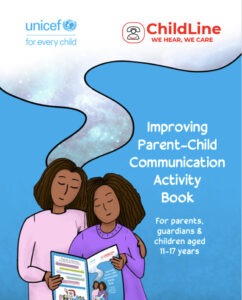[et_pb_section fb_built=”1″ _builder_version=”4.4.6″ da_disable_devices=”off|off|off” da_is_popup=”off” da_exit_intent=”off” da_has_close=”on” da_alt_close=”off” da_dark_close=”off” da_not_modal=”on” da_is_singular=”off” da_with_loader=”off” da_has_shadow=”on”][et_pb_row _builder_version=”4.4.6″][et_pb_column type=”4_4″ _builder_version=”4.4.6″][et_pb_text _builder_version=”4.4.6″]
Around the world, people are adjusting to working from home or being home-schooled. Without a doubt, this can be a challenging experience for most families and staying mentally healthy can become difficult.
Parenting during a pandemic (like COVID-19) can increase the levels of stress experienced by all members of a family. The disruption in daily routines and the anxiety over becoming exposed to this new virus can often lead to interpersonal conflict (for example, domestic violence and child abuse), depression, violence, etc.
These are some common signs that may be experienced when children and adults are frustrated:
- Feeling fearful or worried about personal health or the health of others
- Difficulty sleeping or sleep disturbances
- Nightmares or daymares
- Changes in sleep or eating patterns
- Lack of enjoyment from past times
- Increases in alcohol, drug or tobacco use
- Increased aggression
- Restlessness
- Panic attacks
- Worsening of pre-existing mental conditions e.g. depression
- Worsening of chronic health problems e.g. hypertension/high blood pressure
- Confusion
- Tiredness
- Difficulty communicating
- Easily irritated
Although these times may seem never-ending, having the right attitude when dealing with conflict or negative emotions can make a huge difference.
Things to keep in mind when domestic interactions become challenging:
- Everyone reacts differently to stress and change
- It is important to introduce structure at home. For example, creating a weekly timetable with chores and responsibilities for each person. Time should be allocated for relaxation, work, exercise, bonding, etc.
- It is important to take care of your mental health. Remember, there is no health without mental health.
Despite the challenges, families can emerge from the coronavirus crisis (and by extension any other crisis) with a sharpened ability to adapt to changing circumstances. This is a skill set that your family will have for life. Parents are also models who are constantly under observation by their children. Children observe their parents learn codes of conduct and parents must be mindful of the vital role they play in their child’s overall development.
As a parent, your role is to:
- Take care of the child’s biological and emotional needs
- Provide a safe and supportive environment
- Protect your child from harm
- Teach and educate your child
- Provide guidance, assistance and direction
- Support and motivate your child
- Discipline gently but effectively
The Alliance for Child Protection in Humanitarian Action created a document called, “Technical Note: Protection of Children during the Coronavirus Pandemic” which underscores several implications associated with the COVID-19 pandemic for children, their parents, the family unit, the wider community and the world. In this document, there are six domains of child protection risk potentially facing children across the globe. Child protection risk factors refer to circumstances that now put children, especially those who are vulnerable, at increased risk of being abused. These child protection domains include:
- Physical and emotional maltreatment
- Gender-based violence (GBV)
- Mental health and psychosocial distress
- Child labour
- Unaccompanied or separated children
- Child protection risks 6: Social exclusion
Children, Resilience and Discipline
Research has proven many times that children, in some ways, are more resilient to adverse situations than adults. Parents can find comfort in knowing that children are likely to overcome challenges, however, parents still have a critical role to play in helping children sustain effective coping strategies as problems arise. The “pandemic period” can be viewed as a unique opportunity for parents to be better role models for their children through being an exemplar, open communication and practising emotional regulations during difficult periods. There will be situations where more than one strategy may be required to achieve desired behavioural outcomes. Keep in mind that children will be children at the end of the day. It is common for parents to become impatient or frustrated when children fail to follow instructions, are disobedient, get into arguments with the siblings, accidentally break things and the list goes on.
Moreover, corporal punishment is the use of physical force with the intent of inflicting bodily pain, but not injury, for correction or control. However, the use of corporal punishment can lead to physical abuse, according to the intensity and justification of actions.
[/et_pb_text][/et_pb_column][/et_pb_row][/et_pb_section]








